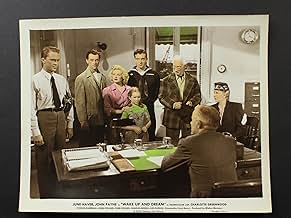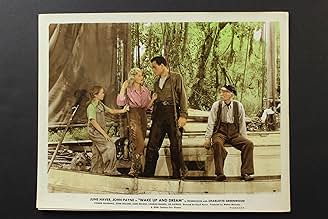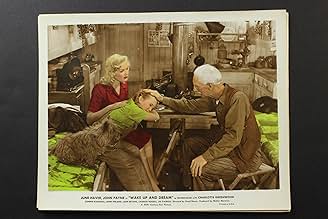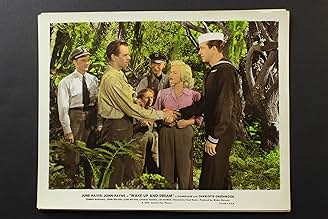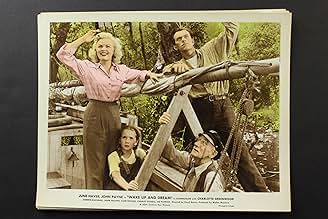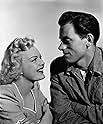A little girl asks her guardians to take her by boat to a nearby swamp believing her older brother, a sailor who recently went M.I.A. in WWII, is somehow there. She finds a grumpy old Crusoe... Read allA little girl asks her guardians to take her by boat to a nearby swamp believing her older brother, a sailor who recently went M.I.A. in WWII, is somehow there. She finds a grumpy old Crusoe-like hermit, instead, but there's still hope.A little girl asks her guardians to take her by boat to a nearby swamp believing her older brother, a sailor who recently went M.I.A. in WWII, is somehow there. She finds a grumpy old Crusoe-like hermit, instead, but there's still hope.
Eddie Acuff
- Bus Driver
- (uncredited)
Ernest Anderson
- Black Man
- (uncredited)
Stanley Andrews
- Conductor
- (uncredited)
Oliver Blake
- Mr. Agrippa
- (uncredited)
Harlan Briggs
- Praddle
- (uncredited)
George Cleveland
- Prof. Feverfew
- (uncredited)
Marvin Davis
- Lester Lucash
- (uncredited)
Francis Ford
- Old Man at Counter
- (uncredited)
- Director
- Writers
- All cast & crew
- Production, box office & more at IMDbPro
Featured reviews
Although some may argue that the best part of this film is the frequently used song "Give Me the Simple Life," I found it to be relaxing and charming.
When viewing any film like this, I believe it's important to remember that it was released after our nation had endured a decade of depression followed by 4 years of the horror of WWII. This quiet little film provided relief from the stress of those traumatic years, and a glimmer of hope for the future.
The entire cast was down home friendly and comfortable to watch. The color photography is warm and welcoming, and the background score provides the appropriate mood for each scene and some hope for the future.
I watched it on Classic Reel one chilly Spring morning and enjoyed every minute.
When viewing any film like this, I believe it's important to remember that it was released after our nation had endured a decade of depression followed by 4 years of the horror of WWII. This quiet little film provided relief from the stress of those traumatic years, and a glimmer of hope for the future.
The entire cast was down home friendly and comfortable to watch. The color photography is warm and welcoming, and the background score provides the appropriate mood for each scene and some hope for the future.
I watched it on Classic Reel one chilly Spring morning and enjoyed every minute.
In case anyone is asking Wake Up And Dream is not a musical version of the Thirties Cole Porter review, nor is it a remake of the Universal film from the Thirties of the same title. This film is a whole other creature altogether and mainly known for introducing the song Give Me The Simple Life.
In fact the film starts out with John Payne singing Give Me The Simple Life to his little sister Connie Marshall. Payne's decided to enlist in the Navy and he does and then strangely disappears for most of the film until the end.
That's because he's reported missing in action and little Connie decides to use the good services of Clem Bevans who's built a sailing craft in his landlocked town and wants to offer to the U.S. Navy in time of war. And also to get away occasionally from his wife Charlotte Greenwood. Bevans and Marshall together with June Haver a server at the local diner all start out humoring the child's fantasy about finding her missing brother. Along the way they pick up a discharged seaman in John Ireland who joins their merry crew.
Wake Up And Dream is a strange film that quite frankly I didn't get most of the time. This one was strictly for the kid trade back in 1946.
Still it did introduce a very popular song, sung first by Payne and then by June Haver on the screen. But Darryl F. Zanuck frowned on his stars making records and the hit record in 1946 was done by Bing Crosby. The song perfectly fits his style. Back in the day Bing must have insisted to Jack Kapp at Decca records that he record Give Me The Simple Life which was written by Harry Ruby and Rube Bloom.
If you like the song and the stars than you should see Wake Up And Dream, otherwise you can sleep through it and not miss all that much.
In fact the film starts out with John Payne singing Give Me The Simple Life to his little sister Connie Marshall. Payne's decided to enlist in the Navy and he does and then strangely disappears for most of the film until the end.
That's because he's reported missing in action and little Connie decides to use the good services of Clem Bevans who's built a sailing craft in his landlocked town and wants to offer to the U.S. Navy in time of war. And also to get away occasionally from his wife Charlotte Greenwood. Bevans and Marshall together with June Haver a server at the local diner all start out humoring the child's fantasy about finding her missing brother. Along the way they pick up a discharged seaman in John Ireland who joins their merry crew.
Wake Up And Dream is a strange film that quite frankly I didn't get most of the time. This one was strictly for the kid trade back in 1946.
Still it did introduce a very popular song, sung first by Payne and then by June Haver on the screen. But Darryl F. Zanuck frowned on his stars making records and the hit record in 1946 was done by Bing Crosby. The song perfectly fits his style. Back in the day Bing must have insisted to Jack Kapp at Decca records that he record Give Me The Simple Life which was written by Harry Ruby and Rube Bloom.
If you like the song and the stars than you should see Wake Up And Dream, otherwise you can sleep through it and not miss all that much.
Far and away, that's the most memorable song in this naïve and dated war-time fantasy, based on the novel "The Enchanted Voyage" by Robert Nathan, directed by Lloyd Bacon.
Since I'm a fan of 20th-Century Fox musicals of the Golden Age, I anticipated a great deal of lively, tuneful fun from "Wake Up and Dream", and I was disappointed by what I saw. A naïve, substandard children's fantasy, it mainly works as heavily sentimental reflection of its war-enshrouded time.
John Payne plays a farmer Jeff Cairn who, after he enlists in the Navy, disappears and is believed to be dead. Connie Marshall is his young sister Nella who is searching for him, along with a good-hearted old coot (Clem Bevans) in a boat called "Sara March".
June Haver, who deserved better than what she got, plays the saccharine waitress Jenny falling in love with Payne and goes along with the voyage, together with an eccentric dentist played by John Ireland.
The highlights are Payne's heartwarming rendition of "Give Me the Simple Life" at the beginning, and then later Haver, in a moment of sweet vulnerability, sings the song to show her love and adoration for Payne.
The Technicolor looks sumptuous, but the story is not that interesting. I suggest you skip it, unless you're interested in the stars or the subject.
Since I'm a fan of 20th-Century Fox musicals of the Golden Age, I anticipated a great deal of lively, tuneful fun from "Wake Up and Dream", and I was disappointed by what I saw. A naïve, substandard children's fantasy, it mainly works as heavily sentimental reflection of its war-enshrouded time.
John Payne plays a farmer Jeff Cairn who, after he enlists in the Navy, disappears and is believed to be dead. Connie Marshall is his young sister Nella who is searching for him, along with a good-hearted old coot (Clem Bevans) in a boat called "Sara March".
June Haver, who deserved better than what she got, plays the saccharine waitress Jenny falling in love with Payne and goes along with the voyage, together with an eccentric dentist played by John Ireland.
The highlights are Payne's heartwarming rendition of "Give Me the Simple Life" at the beginning, and then later Haver, in a moment of sweet vulnerability, sings the song to show her love and adoration for Payne.
The Technicolor looks sumptuous, but the story is not that interesting. I suggest you skip it, unless you're interested in the stars or the subject.
6bux
The cast is top-drawer, the songs are great and the color is brilliant in this war-time fable of a little girl searching for her brother, listed MIA during WWII. The predictable story is presented in interesting fashion, laced with some good songs, especially a rendition of "Off To See The Wizard." Also of interest is the performance by a very young John Ireland, in a non-action role. Never destined to be a classic, it is still good viewing for kids and adults.
"Wake Up and Dream" is not a film for everyone. This is because the plot is VERY schmaltzy and might make some cringe...while others will enjoy the movie. Don't say I didn't warn you!
The film begins with Jeff (John Payne) going off to war. He leaves his little sister behind (even though he had a deferment since he was her sole caretaker) and promises if he's lost, he'll be 'waiting on their island'...whatever that means. Well, soon he is missing in action and the young sister goes off on a hairbrained search for him. While this is hard to believe, adults agreeing to go with her on a boating trip from the Midwest does seem amazingly far-fetched! Does it get more difficult to believe? You betcha!
I enjoyed most of the film despite its heavy infusion of schmaltz. However, the ending really laid it on thick...too thick...to the point where it became a bit annoying and ridiculous. Decent acting but I just couldn't love this film despite all its good qualities.
The film begins with Jeff (John Payne) going off to war. He leaves his little sister behind (even though he had a deferment since he was her sole caretaker) and promises if he's lost, he'll be 'waiting on their island'...whatever that means. Well, soon he is missing in action and the young sister goes off on a hairbrained search for him. While this is hard to believe, adults agreeing to go with her on a boating trip from the Midwest does seem amazingly far-fetched! Does it get more difficult to believe? You betcha!
I enjoyed most of the film despite its heavy infusion of schmaltz. However, the ending really laid it on thick...too thick...to the point where it became a bit annoying and ridiculous. Decent acting but I just couldn't love this film despite all its good qualities.
Did you know
- TriviaThe jukebox in the cafe when June Haver dances with and sings "I Wish I Could Tell You" to John Payne is a Wurlitzer 412, circa 1936, of which more than 30,000 were produced. The machine held only a dozen 78-rpm records and could only play one side. During WW2, production of jukeboxes was halted as materials were needed for the war effort, and since this film is set in 1943, it stands to reason that a small cafe would still be making good use of its 1936 jukebox. After WW2, jukeboxes went back into full production, and thousands upon thousands were placed in cafes, diners, bars and restaurants nationwide.
- ConnectionsReferences Le Magicien d'Oz (1939)
Details
- Release date
- Country of origin
- Language
- Also known as
- The Enchanted Voyage
- Filming locations
- Production company
- See more company credits at IMDbPro
- Runtime
- 1h 32m(92 min)
- Aspect ratio
- 1.37 : 1
Contribute to this page
Suggest an edit or add missing content

